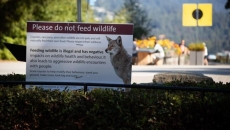A new survey suggests that most Canadians feel news should be free and accessible for anyone, while also believing that media will find other ways to make money.
Leger conducted a national online survey of 1,564 people over the weekend to seek opinions about the Liberal government's Online News Act.
The law, which comes into effect later this year, will force digital giants such as Google to compensate media outlets for content that is shared or otherwise repurposed on their platforms.
About three out of every four respondents said they were aware of the Online News Act, formerly known as Bill C-18, with 34 per cent of respondents saying the law is a good thing to help media outlets that compete for advertising dollars with tech giants.
In response to the bill, Meta removed news from its social platforms Facebook and Instagram, irking respondents of the survey.
Overall, 59 per cent of respondents agreed the company should restore access to news, and only 12 per cent agreed that Meta should be allowed to protest the legislation.
"It is sort of interesting because there isn't much opposition to the bill itself," said Christian Bourque, executive vice president at Leger.
"There's opposition to the fact they would not get their news whenever they want, wherever they want."
The survey suggests that two out of every three Canadians think that news should be free and accessible to anyone, and "the struggling media have other ways to make money."
That feeling was highest among 18 to 34-year-olds, a group that mainly gets their news from social media.
Bourque said there's a sentiment of: "It's there, it's out there. I should be entitled to have access to it."
He said this is a byproduct of the internet and the idea that it should give people universal access to whatever they want.
"And social media basically offered everything for 'free'," he said. "I think most Canadians expect that this is how you get news."
Prime Minister Justin Trudeau has often said that Meta is refusing to "pay their fair share" because they chose to remove local news from their platforms instead of negotiating deals with publishers, as the law requires.
The survey suggests that 43 per cent of Canadians support the bill, while 31 per cent are opposed and 26 per cent don’t know enough about the situation to have an opinion.
The polling industry's professional body, the Canadian Research Insights Council, says online surveys cannot be assigned a margin of error because they do not randomly sample the population.
News companies have long relied on subscribers, viewers and advertisers to deliver revenues, but in recent years have watched each of those sources decrease.
The Canadian Media Concentration Research Project found Google and Facebook collectively accounted for 79 per cent of an estimated $12.3 billion in online advertising revenue in 2021, and more than half of total advertising spending across all media.
News Media Canada has said that advertising revenue for community newspapers in the country dropped to $411 million in 2020 from $1.21 billion in 2011. During that timespan, almost 300 papers either disappeared or merged with other publications.
Bourque said respondents believe media will find some other way to make money. "But what other way?"
The survey indicates nearly half of Canadians, or 47 per cent, noticed the change after Meta blocked news, with higher numbers of 54 per cent among Quebecers and 59 per cent among those who get their news mainly through social media.
Respondents are turning elsewhere for news, with 22 per cent of respondents saying they're turning to TV and radio, 20 per cent saying they are going to free media websites and apps and 13 per cent choosing other social media sites like Reddit and X, formerly known as Twitter.
Only six per cent said they're willing to pay for a subscription to access news directly.






